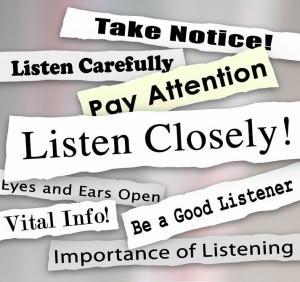
Most funeral directors know that one of the most important traits that someone in the funeral industry can possess is being a good listener. The problem is that most of us are so busy talking that we forget to really engage in listening. However, superior listening skills are essential to being a good, effective and compassionate funeral director. At a time when grief hampers the communication skills of most clients, being able to determine what a person is truly saying and truly wants is crucial. There is a lot of information being shared when funeral arrangements are being made. We need to not only be good listeners but also be able to create a trusting environment that stimulates the important conversations that need to take place. Fortunately, good listening skills can be learned.
The basics of good listening skills
 Being an effective listener is a skill, just like reading or writing good letters. Some of the tenets of being a good listener include…
Being an effective listener is a skill, just like reading or writing good letters. Some of the tenets of being a good listener include…
1. Assume everyone has something interesting to say. Everyone who is truly speaking from their heart has interesting and thought-provoking things to share, maintains Nancy Kline in her book, “Time to Think.” Throw aside any assumptions or pre-conceived opinions based on a person’s dress, age or address.
2. Create conditions that are right for listening…and sharing. The best conditions for sharing information (and for listening) are situations where there is little tension. Such spaces are quiet, gentle and unhurried. For funeral directors and their staff, this means creating a peaceful oasis where you can meet clients as well as leaving your phone and other electronic devices behind in your office. You might also want to have soothing music playing and a calm décor, even a scented candle burning can help. Allow more time than you think you might need. You don’t want to be fidgeting or looking at your watch while you are trying to listen. These actions all hinder good listening and good sharing. The family you are serving should feel like they only family you are serving when handling funeral arrangments.
 3. Pay attention. This may sound obvious, but too many times we are busy thinking about what we have to do next or what we are going to say in return that we miss a large part of what a person is saying to us. On average, only 20 percent of what we hear makes it into our short term memory! No wonder effective communication is so tricky.
3. Pay attention. This may sound obvious, but too many times we are busy thinking about what we have to do next or what we are going to say in return that we miss a large part of what a person is saying to us. On average, only 20 percent of what we hear makes it into our short term memory! No wonder effective communication is so tricky.
Another interesting thing happens when we pay attention, according to Kline–the person speaking enunciates more clearly and organizes his or her thoughts more succinctly. In short, the better we listen, the better they speak and the better we communicate. The logic is simple; when our thoughts wander and we pay poor attention, the speaker starts to feel like they aren’t valued and what they are saying isn’t important. They become self-conscious, hampering their communication skills. In the funeral industry, where many of the people we speak with are already stressed by grief, paying attention is especially important.
Paying attention also means no interrupting and not finishing the other person’s sentences. As a funeral director, it also means waiting until the person has finished what they intended to say before offering advice. Be prepared to ask pointed questions and converse about everyday things that will open doors that might not otherwise open. Many people are usually private about their family and loved one’s. Building trust and getting people to understand that to make a funeral as special and unique as the life lived, we need and have this one chance to make a funeral personal. Too often, we are tempted to pigeon-hole a client into a funeral plan we’ve used many times before…whether or not that’s what the client wants. Today more then ever the easy way is not the way when it comes to meaningful funerals. Using the services of a certified funeral Celebrant will also help create a more personalized and meaningful funeral or memorial, because Celebrants are more trained to draw out and capture the kind of information that can be used in a more personal ceremony. Clergy does not usually use such an extensive interview process and some do not meet with the family at all. It just kills me when the clergy will read the obituary as part of the ceremony (Huge Fail).
4. Don’t think for the speaker. Helping people doesn’t always mean thinking for them. You might assume that since you are the funeral expert and they are coming to you for help that it’s up to you to decide what’s best for them. A better plan of action is to hear them out. Often customers will tell you what the best solution to their perceived problems are if you wait for them to finish talking and not jump right in with your perfect “solution.” In general, advises Kline, people are more apt to be happy with the outcome if they arrive at the solution themselves than when you tell them what they should do.
Are women better listeners?
 Pop culture has maintained for years that women are better listeners than men. How many jokes have you heard where the wife exclaims, “You just don’t listen to me” to her husband? There is actually some valid science behind this claim. It seems that men and women process language and communication differently. Men listen with half of their brain, while women engage their entire brain while listening. The jury is out whether that finding makes women better at listening. However, if you have a female on your staff, you might want to include adding interviews with prospective clients to her job description. According to at least one study, women ARE more empathetic than men.
Pop culture has maintained for years that women are better listeners than men. How many jokes have you heard where the wife exclaims, “You just don’t listen to me” to her husband? There is actually some valid science behind this claim. It seems that men and women process language and communication differently. Men listen with half of their brain, while women engage their entire brain while listening. The jury is out whether that finding makes women better at listening. However, if you have a female on your staff, you might want to include adding interviews with prospective clients to her job description. According to at least one study, women ARE more empathetic than men.
Listening to the generations
The listening skills that have worked well for you over the years in your business may not be the ones that will serve you well in the future. Increasingly, we are dealing with members of the large baby boomer generation as their elderly parents begin to pass away. Soon, it will be their children (and grandchildren) with whom will be talking about end-of-life arrangements. These younger clients are more direct and less patient, in general, and will require us to have additional listening skills to be the best funeral service providers we can be.
- Listening to Baby Boomers. The Baby Boomer generation (those born between 1946 and 1964) are currently in the midst of making end-of-life arrangements for their parents as well as pre-planning their own funerals. This is an independent generation who are used to doing things their own way. They want funerals to be more personalized, to be more life celebrations and less somber affairs. This generation is more apt to break the traditional funeral “norms” and opt for things like contemporary music, a celebrant instead of a priest and a beach setting instead of a church. This group is also embracing more enthusiastically the concept of pre-planning their own funerals. With more than 76 million Baby Boomers in the United States (one quarter of the US population), this could become a very lucrative market for those in the funeral industry. Given this generation’s need for customization, good listening skills will be more important than ever.
- Listening to Millennials. Millennials are those born in the 1980s through the early 21st century. In many cases, these are the children of Baby Boomers. Unlike their parents, these consumers are much more technology-oriented. For funeral directors, that may mean being able to communicate with them via Skype or Facetime rather than in person. This group is also more likely to prefer texts to phone calls. However, changing the technology doesn’t mean that you can stop listening. You just have to adjust your approach to make them feel the most comfortable. One additional caveat about this group: ignore them at your peril. While taking the wrong approach or not listening to a Baby Boomer may lose you a client, ignoring a Millennial will also lose you their friends and their social contacts. This generation is much more social and much more willing to share their positive (and negative) experiences than their parents.
The bottom line
As we approach the end of the year and the beginning of 2016, now is a great time to evaluate your listening skills and see where there might be room for improvement. As our clientele shifts to include younger generations, the future of our businesses may just depend on it.
_______________________________

2 thoughts on “New Years Resolution For Funeral Directors… Listen!”